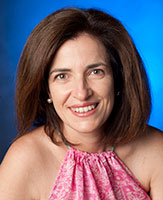

A new research project from The Australian Prevention Partnership Centre is aiming to learn from the success of two Australian programs that are making inroads into the growing problem of childhood overweight and obesity.
The programs, Go4Fun in NSW and PEACH in Queensland, are free healthy lifestyle programs for children who are above a healthy weight.
Queensland researcher Dr Helen Vidgen said both large-scale, statewide programs are aiming to reduce the weight of participating children through changes to their nutrition and physical activity.
What helps or hinders families?
Dr Vidgen, Senior Research Fellow at Queensland University of Technology, is leading an Australian Prevention Partnership Centre project that will focus on these two programs to find out what helps or hinders families to become and stay involved.
The Prevention Centre is a national initiative that is identifying new ways of understanding what works and what doesn’t to prevent lifestyle-related chronic disease. Administered by the Sax Institute, it is funded by the National Health and Medical Research Council, the Australian Government Department of Health, the NSW Ministry of Health, ACT Health and the HCF Research Foundation.
“With PEACH and Go4Fun, families and children who complete the programs have good results, but there is varying success in getting families to engage in programs and remain engaged,” Dr Vidgen said. “There’s a lot to learn from these two trials around participation.”
Embedding programs into routine services
She hopes the study will show the key factors in implementing public childhood overweight and obesity management programs in Australia, such as the need to embed programs for overweight and obese children into routine health services.
“What’s happened with PEACH and similar trials in the past is that, despite demonstrating good outcomes, they have limited project funding and aren’t embedded in the health care system so they’re not part of routine service delivery,” Dr Vidgen said.
In contrast, NSW had implemented Go4Fun within the Health Department so there is a workforce in place to implement it, she said.
“PEACH and Go4Fun are similar programs with similar outcomes, but the retention and sustainability of the program in NSW seems to be quite different and part of that may be because it is embedded in the health care system,” Dr Vidgen said. “Our project will compare both programs, using a framework that sets out key domains of implementation.”
Making comparisons
The research team will interview people in both projects at practitioner, manager and funder level, exploring project sites that did well, or not so well, in recruiting and retaining families.
Ultimately, Dr Vidgen hopes the study will inform further work to establish the management of childhood overweight and obesity as part of usual care in Australia.
“Obesity, in a very simple form, is abnormal growth,” she said. “For children who have abnormal results in any other condition, there are referral and treatment pathways, but health professionals are often unsure what to do with a child who’s overweight or obese, particularly when there is no universally available public service they can refer to. We hope our project can begin to change that.”
Find out more
- Learn about the work of the Prevention Centre
- Read a research paper on comprehensive sector-wide strategies to prevent obesity, published recently in our Public Health Research & Practice journal




